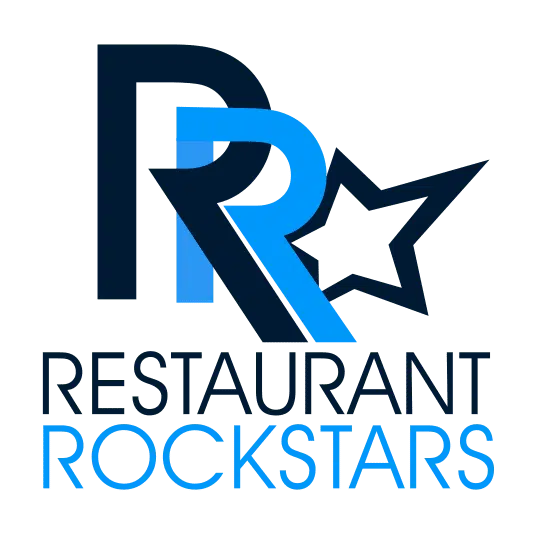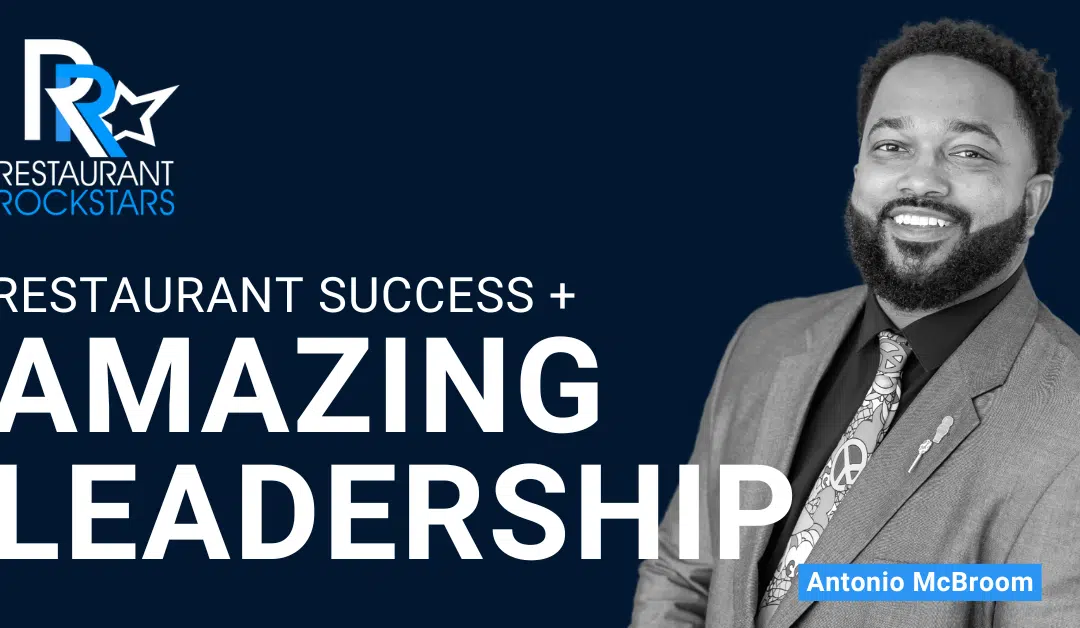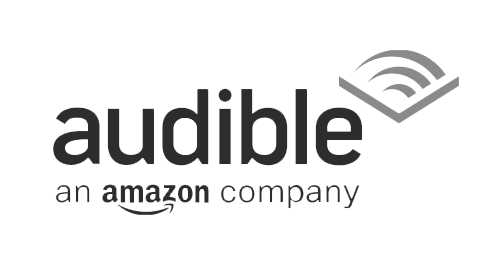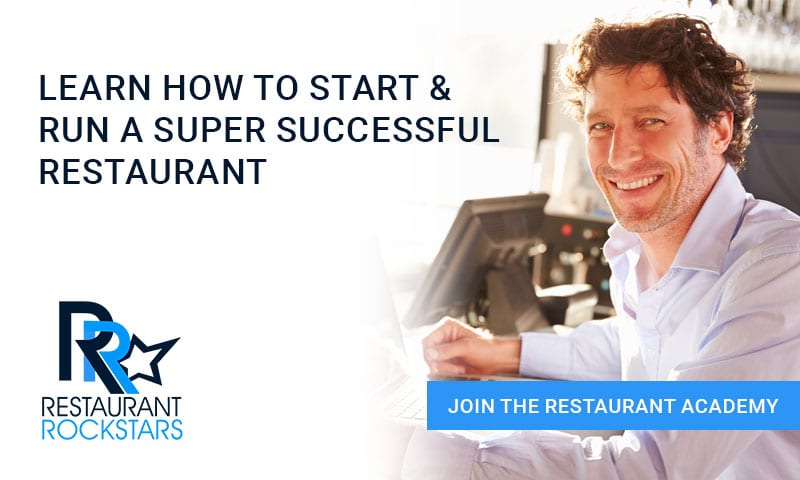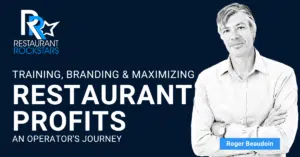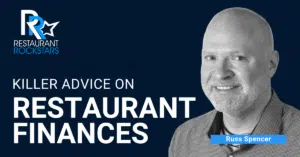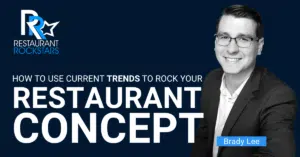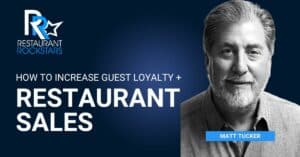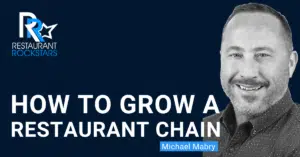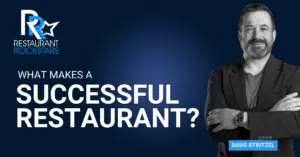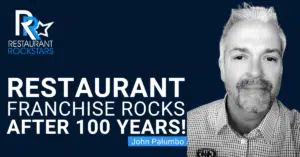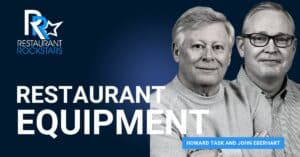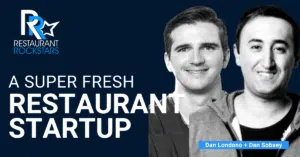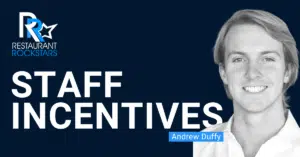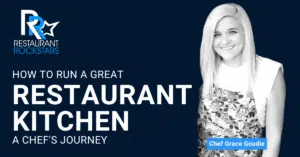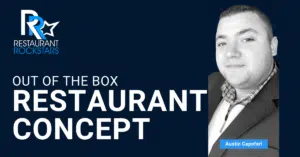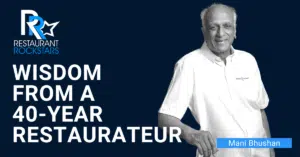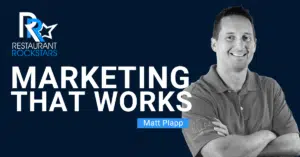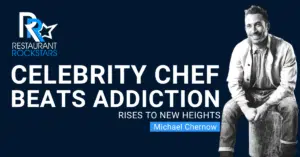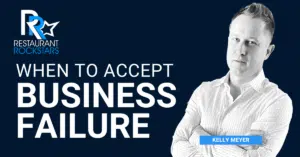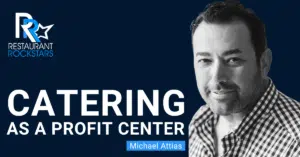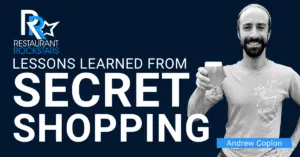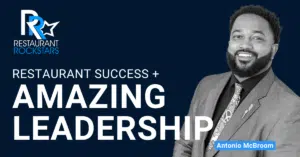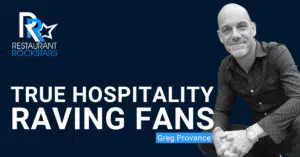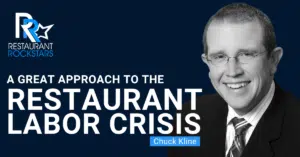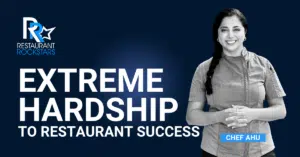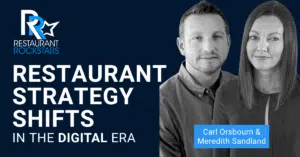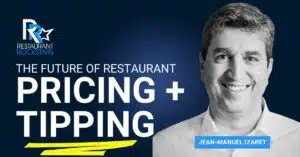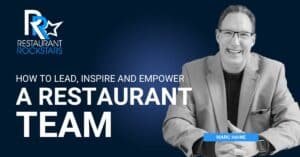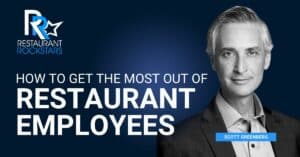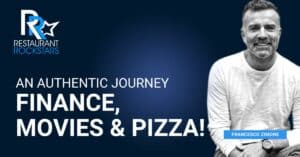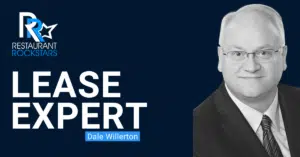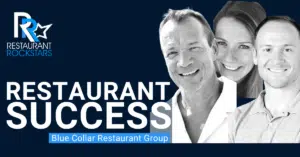Restaurant Rockstars Episode 343
Amazing Leadership & Restaurant Success
LISTEN HERE OR ON YOUR FAVORITE PODCAST PLAYER
Prefer to watch the interview?
Click the video below.
We all seek restaurant success but during these challenging times, you might be thinking “Is it all worth it” and “If we can’t be successful and happy with our business why do it”?
Perhaps the answer is to true restaurant success is rekindling the passion for why you got into this business; but moreover, creating a special culture and leadership style that moves your business forward.
“Leaders recognizing people that come together to improve guest experiences and their own personal work opportunities” is one example of a great culture. To do this takes a different leadership approach and commitment to your team.
In this episode of the Restaurant Rockstars Podcast, I’m speaking with Antonio McBroom, the CEO of Primo Partners. Primo is a leading franchisor of two of the hottest “best of brands” in their categories (Ben & Jerry’s & Starbucks). There are powerful leadership lessons here for your own restaurant success, whether independent or franchise that you can apply today to your operation.
I am particularly inspired by Antonio and Primo’s approach of providing opportunities to those they work with, as well as the underserved within the communities they operate. Their philosophy is paying strong dividends toward company culture and individual franchise success.
Listen on as Antonio shares:
- How he started his career in college within a Ben & Jerry’s store and then went on to become their “Operator of the Year” and largest franchisor
- His winning leadership style, business strategy and mindset
- How to develop, mentor, motivate and lead your team to greatness
- The difference between a Mission Statement and true Company Culture
- Retention programs to keep your great people during this labor challenge.
- The importance of community service to your business and those you serve.
- Helping aspiring entrepreneurs find their own hospitality and restaurant success.
And his best advice for you the operator looking to grow your business or open multiple locations.
Antonio and Primo Partners are working on adding their 3rd “best in class” franchise brand to their fold. I’m betting the leadership lessons shared in this episode will ensure their continued hospitality and restaurant success.
Last, I will always remember to continue practicing Antonio’s MEDS acronym which stands for “meditation, exercise, diet and sleep”. Another best practice to keep you and your team on top of your game.
Watch or listen and then go out there and ROCK your own Restaurant!
Roger
Connect with our guest:
LinkedIn: Primo Partners
Instagram: @PrimoPartners
LinkedIn: Antonio McBroom
0:00
I tell our team all the time, we don’t manage people, right? We, we have self managed people, we manage the system. We manage the processes, but we lead people, you know, it’s important that we vision big in business and in leadership. And so from there, that’s what I bring to my team on a daily basis is, you know, we operate from abundance mindset and not a scarcity mindset. So, you know, we never get caught up in a space of, hey, I’m here, I’m stuck here. Because we know that in two months time, we could have a different reality with a different outcome. And I don’t want you to have to get ready. I want you to be ready for it.
0:40
Hey there. Thanks again for joining me on the podcast. I am so inspired by today’s guest, Mr. Antonio McBroom is the CEO of primo partners. And they have three or soon to be three best in class top name franchises that they operate. And it’s a growing company. But this episode is really about inspired leadership and mentorship and giving people opportunities and raising the bar on guest service and how you develop and transform an operation so that the guest service is stellar, and give people opportunity within your organization. We talk about retention, and the labor crisis and everything this company does that’s innovating and really taking their franchise concepts to the next level, you’re not gonna want to miss this. So stay tuned. It’s a big one thanks to the sponsors of this week’s episode. Smithfield Culinary, Verge Funding, The Birthday Club, and the Restaurant Rockstars Academy. Now, on with the episode,
1:44
You’re tuned in to the restaurant rockstars podcast, powerful ideas to rock your restaurant, here’s your host, Roger Beaudoin.
1:58
I’ve always believed in systems to run a really effective restaurant, they say you have a system if you can walk away and leave your place for a day or a week or a month. And it’s just as successful, just as profitable when you return, if not more. So. Now, the staff are really the foundation of this. And it all comes down to the word empowerment, you know, if you’ve got really great people, and if you can develop those people that have your back, and to run it as if they owned it, treat everything as if they had to pay for it. That’s a super powerful system. Once you have the staff in place, it really comes down to three things. It comes down to one staff training, development, recognition and rewards to create what I call your dream team, how to empower your team to think and act like owners and to treat everything as if they owned it, and had to pay for it, and to deliver amazing guest service experiences to your customers to serve and sell because sales are the lifeblood of your business, not allowing order takers on the floor. But teaching everyone to recognize opportunities and make suggestions that we know that customers will enjoy and appreciate. It all comes down to training, training, training, number two cost controls and maximizing profit. You need to know your critical financial numbers on a weekly basis. And it only takes 10 minutes, but you need to understand these things. How about your daily breakeven how much it costs you to open the doors to your restaurant each day. Inventory is not just walking around and figuring out what your order is that week. It’s knowing the true value of your goods on hand at any given point in time. And you need this information to be able to calculate your true food and beverage costs. Your labor costs are also important and running a weekly labor analysis against sales. If you know these things, I can teach you how to maximize your profit and control your costs. And then number three is what I call marketing firepower and affinity. You know, affinity is defined as a really powerful sense of loyalty and belonging where your customers become raving fans. And they’re like an army of brand ambassadors spreading the word for your restaurant. Well, all of this is included in the restaurant rockstars Academy, if you really want to take your restaurant to the next level, post pandemic, things are heating up, customers are coming back. Now’s the time to really maximize your opportunities, maximize your sales and profits and create that dream team staff. Check it out at restaurant rockstars.com It’s the restaurant rockstars Academy.
4:33
Listen, you’ve heard a lot of noise about the ERC tax credit. Why is it such a big deal because your business already paid a ton of money in payroll taxes and more than likely you qualify to get a ton of money back. Now if you haven’t applied yet. I’m telling you drop everything drop what you’re doing and figure out how to get it done. The truth is and I’m speaking from experience here, it’s super easy to get the money back if you let an expert do the work for you. Now get on this before the government either changes the program or runs out of money. I got hundreds of 1000s of dollars back from my restaurant and it literally saved our business. Now you may have heard it may take many months after applying to get your money back. But that doesn’t have to be the case. If you need your ERC refund sooner to run your business or to take care of some much needed projects. You can speak with Karen Garbutt, the owner of Verge Funding Group, about a bridge loan or other working capital. Now whether you wait for your check up for a bridge, loan or other working capital, it’s likely you have a significant amount of money due back to you so don’t lose it. Now go to the show notes for this episode on our website and use Karen’s calendar link to set up a time to chat with her personally about how much money your business can get back.
5:51
Welcome back, everyone. This is the restaurant rockstars podcast. Glad you’re with us. And Antonio, thank you so much for being on the show. How’s it going, man?
5:58
It’s going great today. Thanks for having me today, Roger,
6:01
man, you’re a super upbeat guy, and also a really dynamic entrepreneur and you got a great story. So I can’t wait to share it with the audience. But let’s start with hospitality. And why this business and how far back it goes for you and what your career story really is. You can go back as far as you’d like, like, what is hospitality? You know, where it all began for you.
6:22
I mean, hospitality is, is a pillar that my business stands on, we’ve got three pillars, servant leadership, growth, and hospitality. And hospitality, for us is kind of the it factor that makes us special we really pride ourselves in, in bringing in World Class hospitality. And particularly what I coined my Ben and Jerry’s team with is we want to deliver the Disney and Ritz Carlton experience in two scoops, right? So set the core of who we are. I’m a southern guy, Southern gentleman. And so born and raised down in North Carolina, I went to UNC Chapel Hill, and you know, just from upbringing with my grandmother, she had a kind of dynamic house where folks came over each day, and she cooked meals for him. I was kind of like, that was her that was her job really is to feed folks. And they’d come and get plates and, and so just treating folks well was something that was ingrained in me. And as I as I got into college and started working at Ben and Jerry’s, I saw, you know, the ability to do that, even though I could couldn’t cook that, well. I’d never developed the chef and skills, but I could really scoop ice cream and put smiles on people’s faces. And that brought me a lot of joy. You know, I tell folks on my team, we could be doing anything, you know, we could be running a funeral home, we could we could we could we could be bill collectors, auditors, you know, nothing wrong with those professions, right? But, but in our space, we really get to bring joy and happiness, and we sell fun. So that’s kind of my roots and in what I do.
7:52
You know, that’s awesome, because we’re going to talk a little bit about Ben and Jerry’s, and then a lot of the other, obviously things that you’re involved in. But it reminds me because I’ve been an entrepreneur for about 30 years, myself, and I read a book, a Ben and Jerry’s book, it was sort of a animated book, and it was called the inside scoop. I’m sure you probably know what I’m talking about. But that was so inspiring. And there’s a mantra that I still use today that came up in that book. I mean, those guys talked about going into like carnival, or Circus School, and like it was all about fun. And you mentioned the word fun. And I think the mantra I’m thinking about is if it’s not fun, why do it and bother to hear that right? For years and years in our restaurants in our team that was sort of the foundation, one of the foundations of hospitality is if you’re not having fun, that guest is not going having fun. And that’s what I’m hearing from you.
8:41
I totally agree. You know, it’s like, you know, we all got to spend time in our craft and working. And I mean, it’s it occupies a big percentage of our time and like us, right. And so it’s ideal for us to find our purpose in the work that we do. But most importantly, have fun while we’re doing it, you know, so we really have primo focus on, you know, doing what we enjoy with people we enjoy making a huge impact, obviously, being compensated appropriately, but also having time for other passions, the other things that we like to do for fun outside of work. So that’s kind of internally that’s like a check that number, I check that score that posts on my team, the same way that we check our bank accounts, you know, it’s just how are you doing in these five areas?
9:27
You mentioned passion outside of business, what are some of those things you’d like to do when and if you have any free time? No.
9:35
I’m a big man of faith. So I absolutely love my church, New Hope church and Durham family are very involved there. And we do missionary trips every year. And that’s kind of some of the most rewarding work that we do. We go to Dominican Republic and last year we actually built built three, three bathrooms in a community that had never had, you know, the dignity of having a private bathroom a private shower. Shower. It’s beautiful. From those three bathrooms 30 different people and, and that kind of stuff. I it brings me a ton of joy, right? Because when I grew up, it’s hard to believe. But you know, just just 20 years ago, in rural North Carolina, we had a Johnny house in the back, and you know, and we had a red bucket for a toilet, right. And it kind of took me back to my roots. It’s been several, several years removed. And I’ve been blessed and fortunate with through my success as a business businessman and entrepreneur to, you know, just just have amazing stuff. But I took me back to those early days. And so that’s something I love to do travel in general, right, whether it’s to missionary trips, but just travel in general is something I like to live by the mantra, you know, we work around life. Right. And so, planning amazing times in life, like just tomorrow is we’re going up to Vermont to Ben and Jerry’s headquarters, where it all began in Waterbury of a Waterbury and yeah, you know, because it’s our 15 year anniversary as a company this weekend, you know, and we believe in celebrating those big moments. And so, you know, when you talk about fun, where that’s one of our core values, we believe in having fun and celebrating, so travel is huge for me. And in sports. You know, I’m a big Tarheel basketball fan.
11:21
I’m not Surprised.
11:23
All Things start here. I bleed, like I say, down here. So it’s a big passion of mine as well.
11:28
Yeah, for sure. Yeah, I was gonna say that I get that Carolina connection with the Tar Heel. So fantastic. Man, you’re definitely all about fun and passion, but it’s also about giving back and we’re gonna get into some of those charitable things that your company does and why but let’s talk about well, before I go there. You mentioned you worked at Ben and Jerry’s in college. So I see that connection. But at any point, did you ever think about starting your own concept, besides the franchises that we’re going to talk about?
11:54
You know, I’m, I’m a developer and an improver. I’m not so much of a kind of creator in inventor that’s that’s not my mind didn’t go that way. A lot I did in college have a crazy, crazy invention that me and me and a partner tried to take the distance it was called juice it up. And it was actually in the electronics business. This was before. You know, you had like, mobile, cell phone chargers everywhere. And I was on a road trip and my phone, my cell phone died. And there were all these paid phones everywhere. But we didn’t have any change. And it was late at night. And so we came up with this genius idea that we were going to put everywhere there was a payphone in America, we were going to put mobile cell phone chargers city, we call it juice it up, you can stop and juice the next day. I know. Yeah. You know, they started making USB cords and cars, and, you know, and addressed it. But aside from that, you know, I’ve been more focused on, you know, taking something from its current state and growing it and improving it. And that’s why it would work I do. I mean, we really develop diverse businesses, we develop diverse communities through real estate. And most importantly, we develop leaders. And that’s what my real passion is, is working with young leaders and helping them get from where they are to where they want to be.
13:15
So that’s primo partners were talking about now. Is that correct? Yes. So can you define a little bit more what primo is and what it does specifically? And then we’re gonna get into the leadership piece, but let’s start with that company that you’re the founder, I’m guessing
13:28
Yeah, yeah. I’m one of the founders are actually a double entendre. So primo in Spanish means cousin. So. So me and my original business partner, Eric Taylor are cousins. And so that was part of the reason we chose the name. But the other the other reason is in black urban culture. Primo means top shelf, creme de la creme. Yeah, number one. Yep. Number one. And so we’ve always, whenever we looked at, you know, doing Ben and Jerry’s and different brands, different projects, we’ve always brought that kind of primo touch to things. And so that’s, that’s what primo was all about. And, as I said earlier, I mean, our why we, why we exist is We exist to develop, you know, to develop and grow and curate, businesses, communities and leaders.
14:15
Nice. That’s wonderful. So how do you work with aspiring entrepreneurs that want to get into business with themselves? Can you walk us through a typical case?
14:23
Yeah, I mean, we believe that it’s no one size fits all to leadership. You know, we really embrace that pillar, I told you of servant leadership, which is really looking at in meeting someone’s highest most priority needs, whether that’s a you know, a high school student that’s coming in, to join us and it’s their first job ever to, you know, someone later in their career that’s doing a career change from a large corporation to a smaller entrepreneurial organization like us, and so we meet them right where they are. And from there, we’ve got a pretty, you know, a pretty robust process we call it the primo people process or PPP that we just have, you know, these different own raps for what I consider world class training and development programs. These are things that we’ve, you know, invested a whole lot into over over our 15 years of just kind of learning, you know, what if someone’s at this certain place in their life, what’s, what’s a good next step for him. And, you know, we partnered with organizations like Kobe, to help with self awareness. We do Positive Intelligence, pq with Shirzad. We’ve done crazy things like Outward Bound wilderness trainings, where I love that a group of leaders would go out to the Everglades, and spend a week just, you know, really, really working on communication, we dealt with alligator. So it’s, you know, it’s just all kinds of different stuff like that, that we think gives our leaders just that next level of impact, whenever it’s time to work.
15:56
Is there a funding arm to the company, we talked a lot about mentorship and development, which gives them the skills to assimilate what you’re doing now and to get into business, is there a funding piece of that, that helps them actually start the business,
16:10
you know, some of the barriers I’ve saw to business success, the two biggest ones have been access to capital, and access to knowledge and information. You know, as a first generation entrepreneur, you know, the ability to provide major access to capital kind of internally isn’t there yet, for our company, I’ll notice on the vision board, but what we really focus on at this juncture is that access to knowledge and information and breaking down those barriers. So you know, as we’ve invested, and we really leverage we read, we really leverage knowledge and information as we you know, what some somebody from our team gets a world class training program, it’s up to them to come and share that with the team, right, and take some of the best kernels of it so other folks can have access to it, too. And so that’s kind of the approach we take into, you know, to help entrepreneurs achieve their dreams, you know, it’s can, you know, can we help you understand the process of becoming a business owner? Can we introduce you to the right folks that can help with obtaining capital and funding when it’s time for you to buy a business or buy a home or save for retirement?
17:19
Wonderful, I love that you use the word leadership and leader a lot versus the word manager. And there’s a huge difference between those two things. So how do you define leadership? And then what is your leadership style?
17:34
In Yeah, I mean, motivate people, that leadership manager, distinction is a big one, I tell our team all the time, we don’t manage people, right, we, we have self managed people, we manage the system, we manage the processes, but we lead people. And so anybody who’s in a in a, in a position that they have, you know, people in our organization that report directly to them, they are a leader, that’s their number one job duty is to is to lead that individual in my leadership style, again, is has definitely been the role of kind of servant leader. As I’ve, as I’ve grown my company, I were to have a whole lot regarding being visionary, you know, just just trying to share, share ideas, perspective vision for what’s possible, because I think a lot of that is what drives our company forward. I’ve saw that, you know, folks, oftentimes, over plan what they can do in one year, and underplaying what they can do in 10 years, right? It’s I mean, if you, anybody listening now, if you think back 10 years ago, to what your reality was, I mean, and how much it’s changed then. And if you if you could project that same, that same rate of change, or even faster rate of change, 10 years out from now, you know, it’s important that we vision big in business and in leadership. And so from there, that’s what I bring to my team on a daily basis is, you know, we operate from abundance mindset and not a scarcity mindset. So, you know, we never get caught up in the space of, hey, I’m here, I’m stuck here. Because we know that in two months time, we could have a different reality with a different outcome. And I don’t want you to have to get ready, I want you to be ready for it.
19:30
That’s fantastic. Thanks for sharing that. Exactly. How do you Well, first of all, you are a visionary. And obviously, you’ve been in business for quite some time, you’ve got experience as a leader, and you’re running multiple operations and you’ve got plans to grow this company. But how do you make big business decisions? Is there a certain mindset or strategy that you apply? Do you use your gut or is it you know, research first, I mean, do you do you analyze things tremendously, or you just have a feel for something You know, it’s right and you act on it, what would you say that strategy might be?
20:04
Hmm. So from, from a tactical approach with decisions, and when you’re in it, when you when you’re in a position where you need to make decisions, big decisions pretty frequently, the tactical way that I put myself in the best position to do that is just by making sure that I’m in peak state, you know, and I do that by, as Brendon Burchard says, taking my meds in med stands for meditation, exercise, diet, and sleep, right, like in those in those meds kind of follow you to the taking that right balance of your meds, over the course of 72 hours impacts your decisions, you know, some days, you may be feeling tired, or you may not be at your entropy game, but it’s because you didn’t get enough sleep two nights ago. And so I’ve in a true leadership position, I really believe in this kind of balanced man’s approach so that when you show up to make big decisions that you’re picked up, you know, from a strategic standpoint, you know, I think that it’s really important to, to think in terms of decades, you know, thinking in terms of decades slows time down. And so when you have kind of this this decades approach, you got a vision board, you got your Northstar of where you’re trying to go to, it actually helps you make decisions more thoughtfully, you know, not for the here and now, but for the for the long term where you’re trying to go.
21:34
I love that meds analogy, and I’m going to use that or remember it. So meditation, exercise, diet and sleep, I think you said is that correct? That’s, that’s great. I believe in all those things. I mean, I tried to exercise daily, I tried to eat well, I tried to get what, you know, good sleep. And believe it or not, I was never a meditator. And my wife brought me into that, and maybe three months ago, and now we start our day with a meditation every day. And it puts you in the right mindset. But it makes you more lucid. And you’ve got clarity and the exercise in the diet and asleep, all those things combined. Because a lot of business people are just charged charged charge. And they’re caught in the daily, you know, putting out the fires. And there’s a lot of stress in business. But you can sort of chill out a little bit by doing some of these things that help your body and your mind and your business. So I’m really glad you shared that. That’s, that’s awesome. So Ben and Jerry’s, okay, it looks like you’re moving on to your 15th store. And that’s obviously a ton of fun. Everyone knows what that brand is all about. But I understand you’re also now getting into Starbucks, and I want to talk about that. But your goal is to have the three best in category franchises, right in the world right now. And obviously, Ben and Jerry’s and Starbucks are two of the most well known. First of all, what’s the third one?
22:53
So that was still it’s still TBD. Okay, so it’s still TBD. And I mean, it’s, uh, I look at as our job as developers, is, we’re really taking special brands that are at a special place, best in category in curating them together. And, you know, I mean, I did Ben and Jerry’s exclusively for for 14 years. Right. I mean, we just started a partnership with Starbucks. And, and that was, you know, that was a that was one of those decisions. We talked about where we, I mean, we thought about that for over a year of do we diversify is an opportunity with Starbucks, the right type of partnership that to diversify into, and we’ll go through that same process anytime we look to bring on another brand partner, but I mean, it kind of seeing the parallels between the two brands that we partner with now, you’ll see what kind of partner we’re looking for. Right? So a company that has, actually so it has a soul, it has this this social justice element to it. So that’s a kind of requirement for us being being aligned with our partner companies, you know, from from a value standpoint is really big. And so we were fortunate to find that both Ben and Jerry’s and Starbucks,
24:08
that’s awesome. And that is a key foundational element that any business you get involved in has to be part and the social responsibility piece is huge. Let’s talk about consistency. Because earlier in this interview, or in this conversation, I should say, you said that you’re an improver. So one of the things we know about franchises is it’s a system. It’s a not to be deviated system, and a lot of people get into franchises with, Oh, I get a better idea. I think I can do it this way. And some franchises or Yeah, some franchise companies and operators have a little bit of leniency and autonomy. And if you bring me a great idea, who knows, maybe could go across the franchise, or no, we have absolutely strict rules and that’s what makes us a success. It’s like do not deviate. Are you allowed to make any changes or shifts and if so, what are those?
24:56
Get big flavor with little labor with smoking fast from Smithfield. It’s fully cooked or smoke proteins including American barbecue staples and global flavors. Everything from ribs to pulled chicken to brisket and barbacoa are all authentically slow cooked to perfection. It’s so delicious. Your guests will never know it wasn’t smoked right in your own kitchen. Now you can add barbecue to your menu without adding a pitmaster to your payroll, visit Smithfield culinary.com/smokenfast that spelled SMOKENFAST
25:32
hey rockstars, let’s talk Restaurant Marketing. I started and ran five high volume restaurants and I was obsessed with marketing, not the traditional kind where you try this and you try that and you hope for the best. That’s like dumping $100 bills out the window, but nobody’s coming in the door. I’m talking about marketing that’s trackable where you know exactly where the business is coming from, and most important that it delivers far more than every penny you spent. So here’s where my friend Dyson comes in. He’s a restaurant person just like you owned his own concepts. Now he runs fan Connect. He’s got something called the birthday club that’s proven to drive new and repeat business in your door. Because everybody has a birthday. He does it all for you to all the heavy lifting, all you have to do is focus on your guests and delivering true hospitality. Why not speak with Dyson yourself. He loves talking shop with operators and there’s no obligation, but I’m pretty sure he can boost your business and put more butts in your seats. If I still own restaurants. It’s exactly what I do. Check it out at getfanconnect.com/birthdayRockstar.
26:44
So allow that’s a that’s a funny word in my world. What’s the saying around? Beg for forgiveness?
26:52
Oh, yeah, it’s easier to beg for forgiveness than ask for permission? Or it’s something like that. Yeah. First, and if it turns out to be huge, then you don’t need to ask for forgiveness. Right.
27:03
Yeah. So I mean, I think anybody who’s worked with me, knows that that’s kind of been one of my one of my ways of approaching new ideas. I think that I think that the franchise structure, the kind of corporate structure, it allows for great creativity, sometimes that structure actually breeds the creativity. You know, I think sometimes if I were doing my own concept without the structuring, without the support that I get from my period companies, you know, I mean, I’d have to worry about r&d and product development and a lot of stuff. Now, well, now that I have the structure that I don’t have to worry about this stuff, I can get super entrepreneurial, when it comes to how I use technology in my business on a local level, or how I do how I activate with my local community, you know, how I bring our brands to life in that local community. And so, you know, I think that for me, it’s been one of those great balances of I’ve worked with companies that really appreciate the diversity of thought that I bring to the table. And, and allow me the opportunity to at least get out here and try some stuff. And then all my ideas, I come up with ideas all day, every day, I just throw it at a wall, right. And, you know, I’ve got I’ve got some some great senior leadership team members that their job is to strike down the vast majority of those ideas, but and figure out which ones of them actually work. And, you know, my experience with my parent companies has been really similar, where I just I fire off a lot of stuff, a lot of ways I think we could, you know, grow our grow our sales through different channels, or try a different product, try different marketing approach. And a lot of times it is something that wouldn’t work, but a few times it does work. And it actually ends up being something good not only for my company, but for other operators in a system.
28:56
So the old adage about location, location still will always hold true, right? When you’ve got a bricks and mortar mortar store of any kind location is really, really important. But you also mentioned that perhaps primo is involved in real estate. So do you own some of the real estate, all the real estate, where your stores are located? How you make your selections on location, what we can own versus lease
29:19
real estate? It’s part of our strategy for sure. Yeah, it was, it was the case that I can own all the real estate that we operate like that would be a dream come true. But in some cases, it’s not possible. You know, we want to be at kind of ground zero of a given city or market that we’re in and oftentimes that’s within a mixed use development or it’s, you know, it’s within a property that, you know, individual ownership just isn’t really a option. You know, all the cases where that’s not the case. We do aspire to own our real estate. We’re not there yet. A lot of our real estate development efforts has been kind of large, large acreage community to velopment where, you know, we take, we take entitle and rezone tracts of land and get them in higher and best use for folks to build and develop on them. And so that’s been a lot of our real estate efforts up to this point in our careers.
30:15
So let’s talk about your strategy on selecting locations. And what makes the most sense is that a combination of visibility and foot traffic and drive by traffic and, and parking and drive through opportunities, like all those elements combine or every property is different, where we try to hit as many of those bases as we can, but they’re not all going to hit based on that, that sweet spot combination of what’s going to well be the most visible and provide that variance for people to find us and get to us.
30:45
It truly varies by market. You know, there are some markets where foot traffic is everything, you know, it’s a it’s a very pedestrian touristy area. And it’s all about how many people walk by the front door. And that that’ll that’ll predict your success that will predict at least your startup success over over time, your guest experience and hospitality will take, you know, final trunk car, but you’d have some markets where, you know, the key is kind of visibility from the road from the driving roads community store, and folks need parking. And, you know, and then it also varies by concept, you know, a Ben and Jerry’s we, we don’t really do drive drive throughs. That’s not a that’s not even something that’s desirable. Whereas with Starbucks, I mean, it’s highly desirable, of course, you know, and so, it really varies by brand and varies by market. But overall, you know, that’s something that we spend, you talked about decisions, that’s one that we make, it’s a big decision that you make on the front end, you spend a lot of time kind of doing research, you literally go and sit and watch a location for eight hours and count how many people walk by and just observe because you need to know, on Tuesday, what are the foot traffic patterns, but you also need to know on Saturday night was the foot traffic pattern. So I’ve seen many cases where the number of stores we own enough folks have looked at and like, Man, this guy’s out here and just sit in and looking for hours on end. But that’s, that’s the kind of due diligence you do. Whenever you making that kind of decision on where to go.
32:13
Yeah, car counts, and talking to people on the street and market research and all those things, but you’re in multiple states, right. And obviously, rents must vary from one community to the next on similar square footage, similar traffic patterns, but yet, you’ve got a magic formula, I’m sure where the numbers have to hit a certain, you know, the key indicators need to be where they need to be, are you finding that to be pretty consistent, or is it kind of up and down and you factor that in your decision
32:41
is really consistent. I mean, the thing is, about location determination is, for the most part, you know, the prime real estate in a given market, you know, stays true for decades on end. But in some of our big cities, I mean, trends change every two years. And so what could have been like your A plus location in 2018, you know, by 2022, it may be a B location. And so, you know, trying to bring that vision hat to things, is really a skill here where you know, you’re maybe looking at a location while you’re looking at it that it may not, it may not say that this is going to jump off the shelf with volume. But you look at all the trends around it, you look at the big development plans that city has, and you appreciate the fact that well, it’s gonna take me over a year to build this location, you know, and I’m in this I’m signing up a 20 year lease a 20 year franchise agreement. Um, you know, so this is a long, I’ve got to think about this as a long term investment. What is my vision, say, will be the case eight years from now, with everything that I know. And so those are the types of factors you play in when selecting locations.
33:53
Well, let’s talk about staffing and onboarding at the store level has labor has been a challenge for this business, specifically, but multiple industries, have you found that it’s been challenging to staff up all those stores? And how have you dealt with that?
34:09
For us, you know, the great migration or great resignation? It’s been called both. So we didn’t we didn’t feel that in really bad ways. Because I think few factors. We’ve always prided ourself in having a magnetic culture, right. I think I think culture eats strategy for lunch. And so our our primo culture is the number one thing that I work on on a daily basis. That’s the number one thing I focus on is culture, and how, you know how we as a company are showing up to our team team leaders. Now with that said, as you have that magnetic culture, people tend to find you this is the type of place where somebody wants to work, not necessarily about the money. I mean, money matters, but it’s really the feeling that you get whenever you’re in an organization like ours and so that really shielded As a lot during that that great migration. You know, that said, I think the, you know, the focus for us has been, you know, to continue to raise our team member experience through appreciation. Through development, a lot of times the fact that we invest in our leaders through the different trainings and developments that we do, that’s a difference maker between us and other companies.
35:27
Now, I read, I believe, that you’ve got about 2% of your revenue that you put back into team development. Is that as some things we’re talking about here? Yeah. Oh, development is huge.
35:38
Yeah. Okay, that makes perfect sense. And it takes a certain person that needs to understand hospitality, but the culture word is super important, because lots of companies have a mission statement. And culture is completely different, where culture is something that develops over time, but it’s based on your core values, but it’s also based on the team and what they bring to the business, to reach that common goal. And fun certainly enters in your culture to all those things kind of combined to to, you know, it’s it’s describable yet, either feel it and know it, or you don’t and you walk into a new place to start a new job or something. And you can just tell I fit here, or I like the people here, and we all are in this to please the guests and to deliver hospitality. And if it’s fun, all the better. And yes, everyone works for a paycheck. But people work for all those other rewards as well. And I think you mentioned recognition, are there any specific, say rewards and recognition programs that happen to you know, make people feel really good about what they contribute to your businesses?
36:45
Yeah, I mean, again, we there is not a one size fits all, you know, there are five different love languages or appreciation languages. And I think strategically we make sure that we’ve got different ways to hit all five of them, whether that’s tangible gifts, right? Like that’s, that’s, that’s simple, I mean, tangible gifts, someone knocks it out of the park with sales, their average, check their, you know, they get a five star guest rating, we do tangible gifts all the time for things like that, if we have a team that, you know, has the busiest hour ever, and we’ve got, you know, got this hourly sales standard, if you exceed that sales standard, everybody gets a cash bonus right there on the spot, beautiful. So, so that those are the tangible gifts, but then it’s also, you know, words of affirmation, and just letting somebody know, they did a great job. And whether you tell them that privately, sometimes you tell it in front of folks, so they get the recognition in front of their peers, you know, you quality time is huge. And so we make sure that we spend time as leaders with our entire teams, whether that’s doing our you know, our company picnic in the summer, or in the year celebration each year, you know, just kind of having those those times where as a team, we go out, we go bowling, we go get a meal, just to celebrate, you know, the some some accomplishment we’ve had. So, you know, speaking all of their appreciation languages in different ways within your company is been my strategy and rewarding and recognizing,
38:12
are you on the road? Much? I mean, do you travel to the different stores in different states? And if so, do you walk in on announced? Or do you let people know I’m coming? Or is it a secret shopping thing, like that’s part of the consistency, it’s like, you want to make sure that every store is delivering on those core values, and that the service is great, and that the quality of the product is great, and that the store is clean? And all that kind of stuff. But maybe you have people that do this? Can you answer that question? Are you part of it?
38:36
Yeah. So we’re set up regionally, where I’ve got a regional leader who’s in who’s in all our shops, you know, every every single tool every other week, they’ve made sure they hit every shot. And so um, so that’s kind of me being an extension, because what 15 units and growing on top of having just an amazing family and in other kinds of tasks in my community here in Chapel Hill, North Carolina, you know, it’s not possible for me to be in every store every week, right? And so, I tried to make it, I try to make it a conscious effort to hit most of my stores once a quarter and spend time, it’s been a few days in the store in that market with that team, once each quarter. But typically, it’s announced when I come it’s kind of it’s known how my regional leaders they do to mystery shops and in you know what, I try to make sure that I’m able to get quality time with my leaders when I’m in market. And so if I do it unannounced, and they happen to be on vacation, or they’re not available, right?
39:35
Yeah, you want the you want the visits to be as productive as they can be, obviously, and it’s a brainstorming thing. I’m sure you encourage others ideas and it’s literally uplift up leveling the organization to improve as you said earlier, so Okay, that’s a good answer. Yeah. Let’s, let’s talk again about Well, we talked about improvement, and I don’t want to get too involved in the pandemic because that’s his past history. And it was a You know, a real challenge for everyone involved, literally across the world. But besides that, pivots came out of the pandemic, you know, stores and operating philosophies changed, and things got turned upside down. And in many cases, they’re better now, because of those pivots. Can you think of anything that you established as a pivot that has now improved your business, and you’ll never go back to the way it was before.
40:26
For pivot for us, since the pandemic, the really the pandemic during during that time, I embraced the wisdom of Winston Churchill, which, you know, he said, during during times of crisis, bad companies will fail, good companies will just survive, but great companies will improve. And so we made a conscious choice that, you know, during the pandemic, it was kind of natural to go in survival mode of just, but we looked at it as an opportunity to double down on what we’d already been doubled down on, which was our people. And so, you know, the second that it went to remote work, and really, we had no work to do, we went heavy leadership development, I mean, we did all kinds of curriculum remotely, that we’d been wanting to do, you know, and we worked on our back office processes and systems. And, you know, just double down in that way, I think, as we’ve kind of come out of the pandemic, in our different markets, the thing that remains true is just how valuable hospitality is. So even though we went into this remote workspace, you know, folks kind of sheltered in place, you know, the joy we get to bring people through in person face to face interactions, is very valuable. And I think the same way that nowadays you have where, you know, the skill of being handy, and being a contractor and being able to fix things, it’s kind of rare. And so the value and cost is going up, I truly believe that the skill of communication and hospitality is one that over time, it’s going to be that same way. And so that’s what we’ve just doubled down on, on break up in the level of hospitality to folks who choose to come visit our businesses.
42:16
Excellent. Yeah. And again, there’s that foundational word hospitality that hits every part of what we do every single day. And they give it back, of course, your company is obviously involved in many charitable causes some famous names like United Way and some other things. How much of that do you get involved in personally or is that at the store level, where they donate a percentage of revenues to some of these charitable causes, or this overall, as a company, we’re Primo. Tell us about that.
42:44
It’s overall as a company, I mean, I do encourage our local store and our local store leaders to get involved in causes that they are really passionate about. And they have a kind of local, what we call change maker budget, where each store has a change maker that’s ingrained in their in their staff. And this kind of gives my team, a team member who may be in college or at an earlier stage in their career to have an extension to their job beyond serving our guests, and actually take ownership of doing some local community impact work and around things that matter to staff. So we encourage that completely. But from from a primo level, you know, we’ve got a strategy we’re extremely passionate about, about equity, about education and about criminal justice reform. And so we’ve focused our efforts on first the who not how of that. So we understand that our gift is in, in business and entrepreneurship, but there are organizations who, that’s what they live and breathe. And so our top strategy is we invest our time and our resources in helping those organizations do what they do even better. So you mentioned United Way, United Way as an organization that’s across most of my markets, and we love partnering United Way. Typically their efforts to you know, eradicate poverty really makes a substantial difference in the communities that we serve in. And then we have other organizations that are near and dear to our hearts, that fight for voting rights, education, criminal justice reform that we partner with closely as well.
44:20
Aside from criminal justice reform, it triggers a thought because here in Maine, I serve on the Board of hospitality, Maine, which is our state trade organization for restaurants and lodging properties. And workforce development has been a huge committee in the last year and a half because labor has been a huge crisis for our industry. And they’re having tremendous success by employing employing the former incarcerated and re indoctrinating them into the community and giving them opportunities for the future. Um, does your company hit on that at all? Or is that something you see in the future?
44:51
No. So we hit on right now, as a matter of fact, last month, we celebrated a major milestone we Have we embraced the journey of gentleman Steve Snipes, who was the first former felon turned Ben and Jerry’s franchisee awesome. And so you know that he’d been in our organization for a few years. Yeah, I went through the primo Leadership Program and attended Sqoop University, we’ve been in Jase corporate, and got his official print franchise approval, and now he’s operating the business in St. Louis, Missouri, you know, and so, we wanted to break down barriers of what’s possible, you know, Steve joined us. And it was unfortunate, because he was in an organization that because of his background, he had hit a ceiling, he couldn’t go into management, because of his background. And, I mean, I believe that all of us is our second chances. You know, and so, as Steve shared that story with me, and he joined our organization, he had a hunger and an eagerness and entrepreneurial spirit that I hadn’t seen before. And so with, you know, with a lot of focus, and a lot of commitment to personal development and rehabilitation, you know, Steve broke down and buried it now, I hope others can see what’s possible as you as we have more rehabilitated citizens joining us, I don’t want them to see that, you know, they, they are limited, they came vote or I can’t, I can’t own a business. No, it’s possible. And, um, you know, in all of our states we fight for, for voting rights, particularly for that segment of our population. Because again, I think everybody deserves a second chance.
46:25
That’s a beautiful story and a great philosophy as well, you know, that’s part of leadership. Also, that takes you so far above management, because leaders recognize something special in people, they recognize either talents or ambition, and they nurture and develop that talent, and they give them new responsibilities and new opportunities. And, you know, and we don’t criticize, we critique their performance, we give them reason, or we give them chances to make mistakes, and let them understand those mistakes. And then we recognize and reward their performance. And anybody can obviously get a second chance. And it’s unlimited what someone could achieve. If someone else sees that and believes in that person, as opposed to just stereotyping and saying, oh, you know, I’m gonna stay away from that, because it’s like, there are success stories to be found. And I think you just gave us a great example of that. So I’m really, yeah. Where do you see your company? 10 years from now? Where are you going next? Besides this third best in concept or best in category? I mean, yeah, it’s gonna happen. I mean, do you see tremendous growth ahead? And is it national growth? Or continued regional growth? What do you see happening?
47:33
Yeah, I’m really excited about this decade is in front of us, you know, the jokes. Oftentimes, as a 15 year old company, we’re in our we’re in our teen years, right. So we’re, we’re business teenagers. And if you think back to all the stuff you did, as a teenager, that’s kind of some of the stuff we’re doing as a business now. But, you know, 10 years from now, when we celebrate our 25 year anniversary, you know, I’m looking for us to be through college and to, to be on to our real careers. And I think, you know, seriously, for us, it’s about leveling up the impact, you know, as we, as we’ve reflected on our journey so far, and we mapped for what that could look like, as a company, we want to be able to say that we’ve left a $10 billion legacy on business excellence through the business that we create, the operating business that we create, and the way that we employ a diverse population and pay in create opportunities for wealth creation within our team, but also the way that we, you know, utilize our funds for supplier diversity, and making sure that we have an inclusive business model, when when it comes to the banks that we use and the lawyers that we use and accounts that we use. So that’s one measure of it. You know, the other measure ever for us, though, is really going to be about how many other people and leaders and businesses can we help have some success that we’ve had, you know, and so that’s where our primo consulting arm comes in, where we’re starting to really package a lot of the best tools and practices that we’ve had, and be able to share it more broadly with other businesses. So you know, the journey from from going from, you know, $100,000 business to over $10 million business didn’t take them as long as it took us.
49:22
Excellent, excellent. Let’s talk about you’ve aligned yourselves with with certain celebrities in the music world and in the sports world and in the media world. How did you make those connections and how has that improved your business or lead to publicity or friendships perhaps?
49:42
Yeah, I mean, again, it’s about values alignment. For us, as we’ve looked to really make the Ben and Jerry’s brand more inclusive, right, that’s that’s, that has been a big push of ours. And that’s that doesn’t just mean the franchise community. It means through how we do it. Is this and how we, how we partner with different folks with our flavors. And so having Colin Kaepernick and chance to rapper Rene as as folks who would now have their own Ben and Jerry’s pining. So it’s just remarkable. And I think that in each of those cases, you’ve got, you’ve got celebrities who, you know, really take serious social equity and racial justice. And so, you know, it’s when we talk about doing a partnership with them, it’s just a natural flow.
50:31
And you obviously brought that connection to headquarters in Vermont, and they created new flavors around those celebrities. And the names are very interesting, I’ve always believed in having creative and interesting names that capture the guests attention, and, you know, bring sales up because of that. But there’s also a social justice and a cause behind these alignments, you might say, so it all is very strategic,
50:57
very strategic. And I can’t take full credit for any of those partnerships simply because it’s a it’s it’s a team effort, as I spoke earlier about just how important it is to have a strong partner with my parent company, Ben and Jerry’s right, in that structure, allowing the creativity, I think my role is just to be the catalyst and accelerator, and to really push the company to go into these new and bold places. You know, I think, if you look at Colin Kaepernick journey, you know, I mean, he was blackballed in the NFL, and prior to really, to really push the company to say, Hey, this is the type of person we need to have a partnership with. They the values alignment is there. And that’s really kind of my role in it. But it’s been great. I mean, it’s and I think that we’ll see more and more of this awesomeness from from Ben and Jerry’s. And I hope that, you know, as I as I get more comfortable with Starbucks, they get more comfortable with me, and I’m able to continue to push them as well. I mean, both of these are already bold companies, but part is continuing to stay and kind of in a leadership space for social justice is you got to have this, this, this catalyst within and I try to be that for the companies that I’m involved with.
52:10
As you get busier and busier and open up more and more of these new brands as well as new locations. How do you maintain the balance of meds of one and then two, there’s got to be no typical day every day for you is different. But you obviously have to have a big strategic 30,000 foot view of all these things happening. And then you’re working very closely with team leaders, as you said, and people that are really, you know, your right hand people within Primo. But what’s Well, I’m going around in circles, but is there such a thing is a typical day? And could you describe any given day and what you do?
52:46
Well, I definitely, as an entrepreneur, embrace the, the, you know, the flowing nature of how my schedule must go sometimes, that said, I try to have a consistent kind of 70% is by a system type of schedule. When I map ahead for a given quarter, you know, in in a given month in a given week, it’s all about rhythm. And I’m kind of kind of big spurt worker, where if I’m if I’m traveling, I like to travel heavy. And I like to, you know, I like to in seven days hit 10 cities and you know, in cover it really quick or if I’m doing my office, I like to block and chunk my schedule, in other words, and so I found that as I get more things on my plate, I’m actually pushing myself to be more productive. And so I’m actually not as busy as I once was. But it requires me raising that productivity score. And one of the ways I’ve done this kind of by blocking and chunking my schedule and creating this level of structure admits the chaos of everything that goes into running, you know, a multi state multi brand, organization,
53:58
Aside from leadership and systems, which are again, foundational elements of growing a business. We have a lot of audience members that might have one single independent location. And they’re thinking about growing that business, whether they have a concept that can be franchised, or if they just want to open another store aligned with what their current store is, or if they want to do a different concept entirely. What is your best advice to people that need to take the next step to open up another location or even five more locations? There’s got to be a, you know, what’s, what would you say to people that are listening that really are ready to grow, or they think they’re ready to grow, but they need to take that next step?
54:38
Yeah, I mean, I always start with just just just taking the idea in ambition and putting it on paper, really documented, it makes it more real. And when you put a date on it, and you put it in real words, from there, you know, I think that as as business leaders is is so important to just live and breathe this 90 day world, you know and in take tangible steps toward your next location, your next acquisition, your next growth effort every 90 days and hold yourself accountable. Because as a as a business owner, sometimes, you know, we, we don’t have that accountability in place that pushes us to actually do the ideas and ambitions that we have. But I think when you put it on paper, and you really make these 90 Day commitments of what’s possible, so let’s say I want to open my second location, by this time next year, well, in 90 days, what could be the reality with that, the reality could be that I’ve started the letter of intent for the second location, right, I’ve, I’ve gotten a letter of intent, or I’ve hired a broker to find me, the, you know, you just kind of go through what’s possible. And he’s 90 days, you, you set the objective, and you put the end date on it, and you just work backwards in 90 day increments, to start working yourself towards it. That’s what I found to be very effective for me as a leader. And it’s also what, you know, the top leaders in my organization, that’s how they run their arms at a business.
56:13
So in terms of systems, there are obviously financial systems, there’s human resource systems with your people and motivation. There’s marketing systems, there’s technology, you obviously have all those pieces dialed, am I missing anything? Is there anything else that you put in place? Obviously, there’s a system to giving back in the social responsibility, we’ve covered most of these things. But if you want to grow a business and open up additional locations, there are these systems that are absolutely non negotiable, you have to have them you have to pay attention to them, you have to educate your people in what they are and their importance. And then you as a leader, literally monitor the systems and the performance of each individual location. Is there anything I’m missing? Or is that pretty much all of it,
56:57
I guess the way that you weave all of that together is by you know, really selecting and choosing a business operating system overall, that fits where your company is at a time, right. And so there are a few of these that are great. And one that I started with whenever I was trying to go from, you know, so typically going from one location to you know, highly energetic talented entrepreneur can make that happen, right? And it maybe you can go from two to three, sometimes people equate it to having children, right? Like, that’s one less thing you can you can you have one child, you can spoil it, you know, you’re there all the time, with the one once you get to, yes, still, you’re still making it work, once you get three, you got to have a system, right, you got to have a support system structure. Because all the different calendars and variables that go into to the unnecessary thing with business and typically three units, you start getting into the, you know, north of a million and a half $2 million territory where that system becomes really important. For us. That Entrepreneurial Operating System, or Eos, as it’s known in the industry attraction was the right fit system at that juncture for us to allow us to add some some some some structure to the chaos that we were creating with our business. But there are other systems as well. But that was the one for us that helped us get really the strategy and process dialed down for people for data, you know, for our actual processes. So I think that’s the missing link that a lot of businesses, you know, do when they hit a ceiling is because the lack of an overall operating system. And I think that businesses need an operating system. I think that high performing leaders in a personal operating system, the same way to the phone, or the computers that we’re on have an operating system behind them.
58:49
That’s just as important as meds I think.
58:52
Yeah, that’s a good job.
58:55
I’m not gonna forget med. So I’m really told me about that. That’s tremendous. Well, that’s fantastic. That is great. You’ve given us great insights and great advice, and I really appreciate you being a guest on the podcast. Antonio, thank you so much.
59:08
Roger, I really enjoyed talking with you today. Thanks for having me.
59:11
I wish you all the best of success in your future growth endeavors in your social responsibility in up leveling business in general and giving people opportunities that deserve it might not get an opportunity elsewhere and you do all those things. So it’s been super inspiring talking to
59:28
Awesome, thank you. And I hope everybody has a great rest of your day.
59:31
That was the restaurant rockstars podcast. Thanks so much to our audience for tuning in. Can’t wait to see in the next episode, so please stay tuned and stay well. Thank you so much, Antonio. I so enjoyed our conversation and the takeaway. Obviously it’s about growing a business and about succeeding in a very difficult industry. But the bottom line was really all about you know, nurturing and discovering talents in the people that work for you and giving them new opportunities in motivating and inspiring and nurturing and developing them to achieve optimum performance. And that opportunity is the foundation of our industry. And you, you and your partners at primo are certainly taking that to the next level. So thanks again for being a great guest on the podcast. Thanks to our sponsors of this week’s episode. And as always, thank you to our loyal audience for tuning in. And we can’t wait to see you next time. So please stay tuned.
1:00:29
Thanks for listening to the restaurant rockstars podcast for lots of great resources, head over to restaurant rockstars.com See you next time.
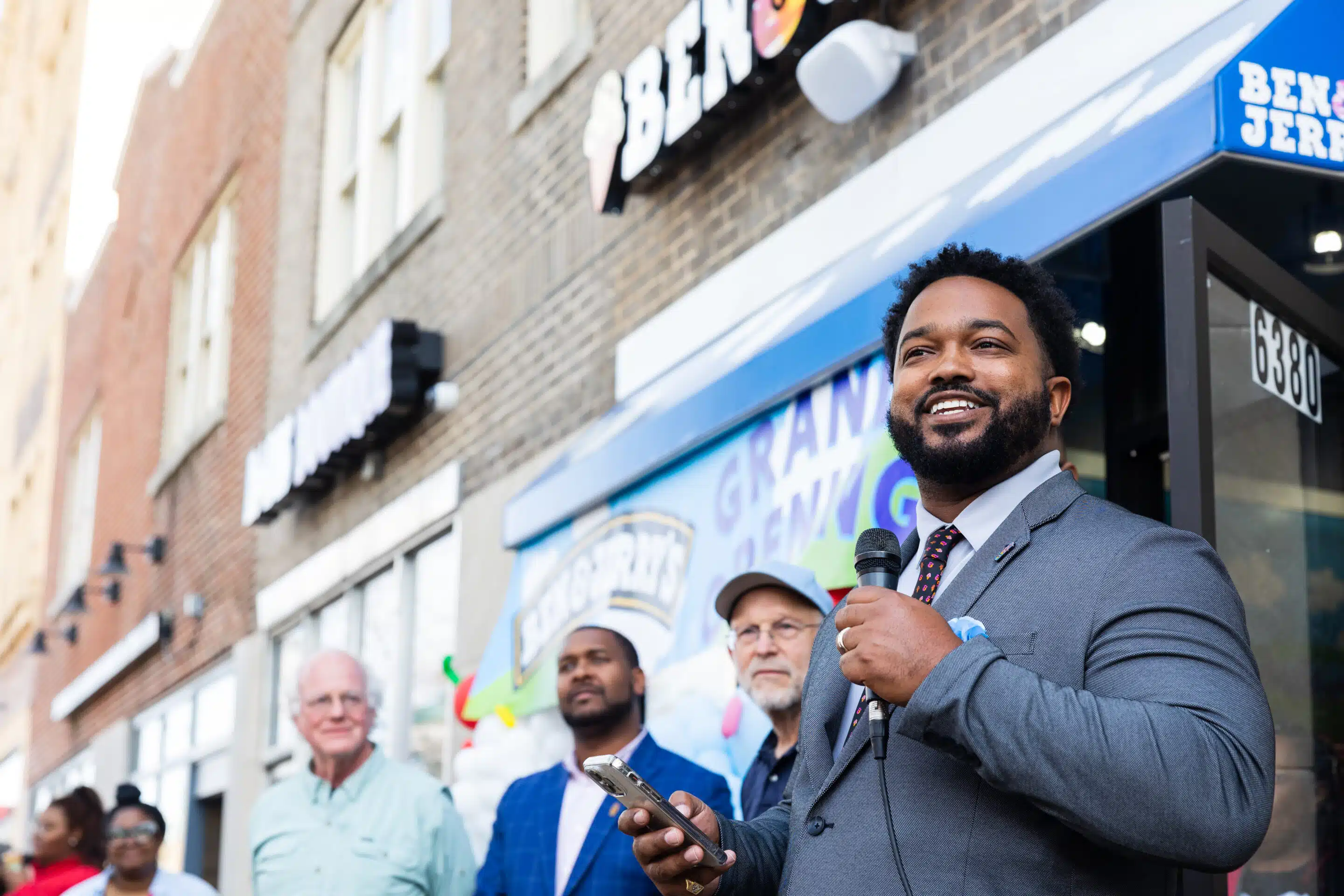
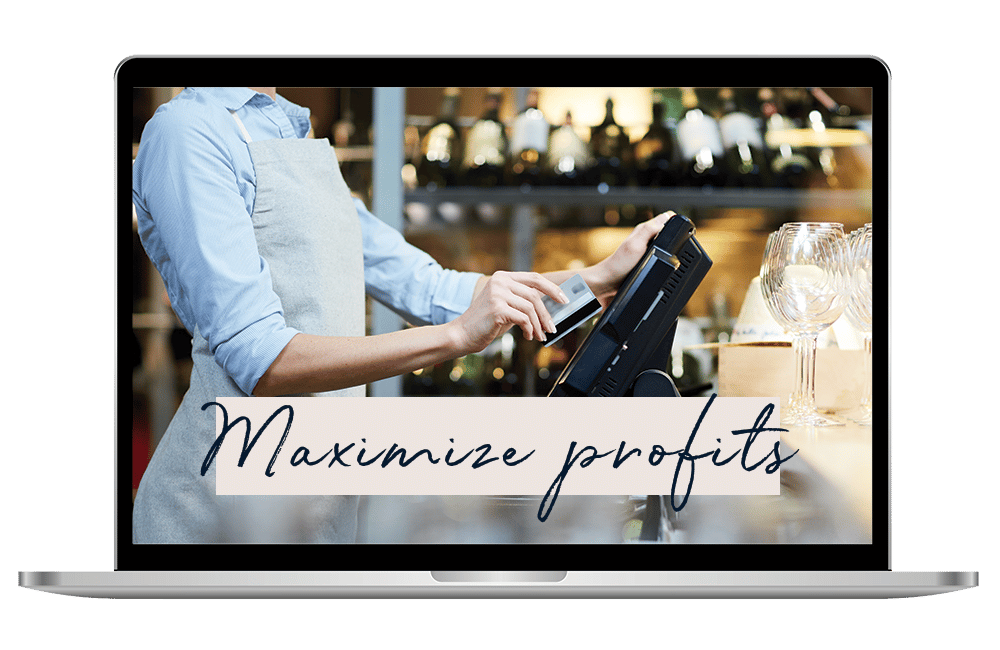
The three costly mistakes you could unknowingly be making?
Find out in this FREE guide and restaurant assessment specifically designed to reveal the unexpected hurdles standing between you and exponential business growth.
Thank You To Our Sponsors
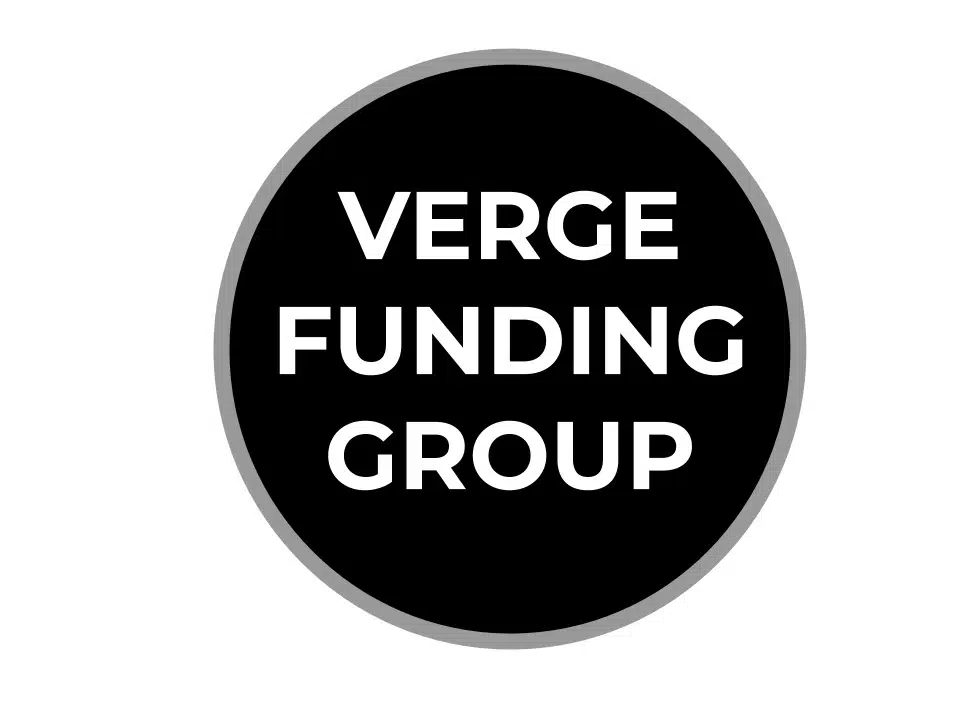
Find Out How Much Your Business Is Due Back from the ERC Program
Set Up a Call with Karen the Owner of Verge Funding
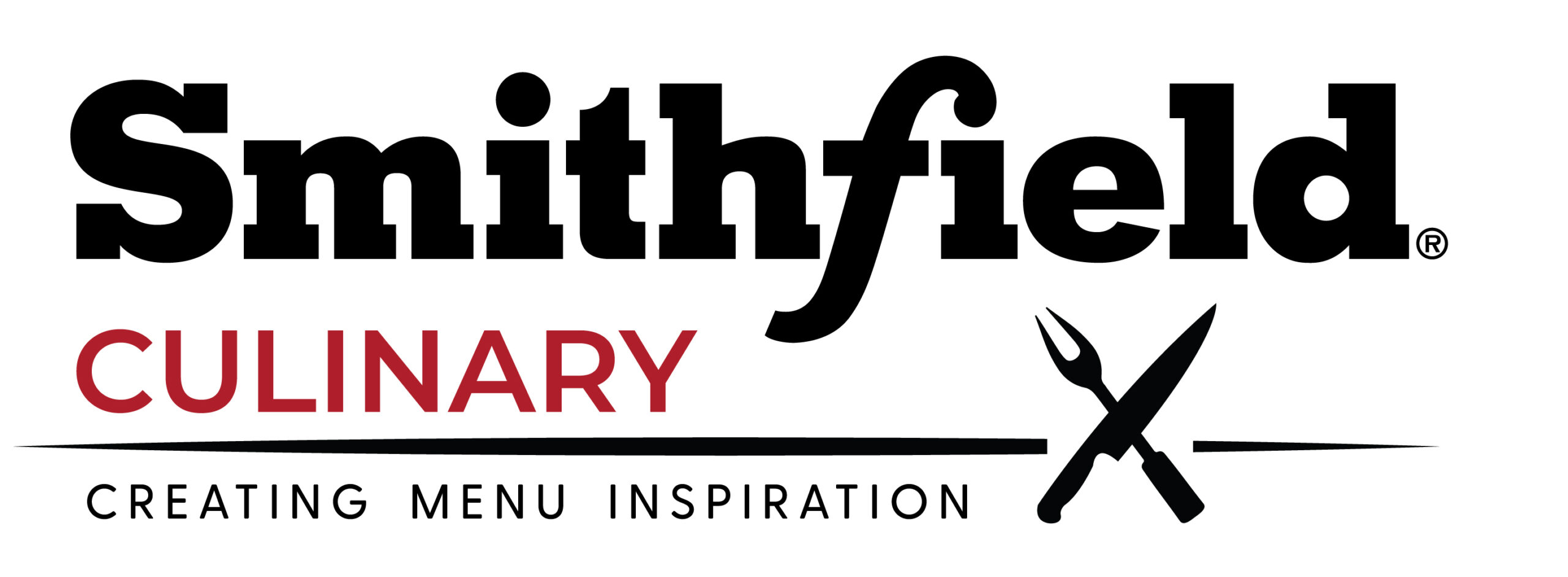
Inspiring Head-Turning Menu Creativity
Culinary Trends & Chef Inspired Recipes - Learn More
Want to become a podcast sponsor?
Please get in touch with Roger at roger@restaurantrockstars.com
